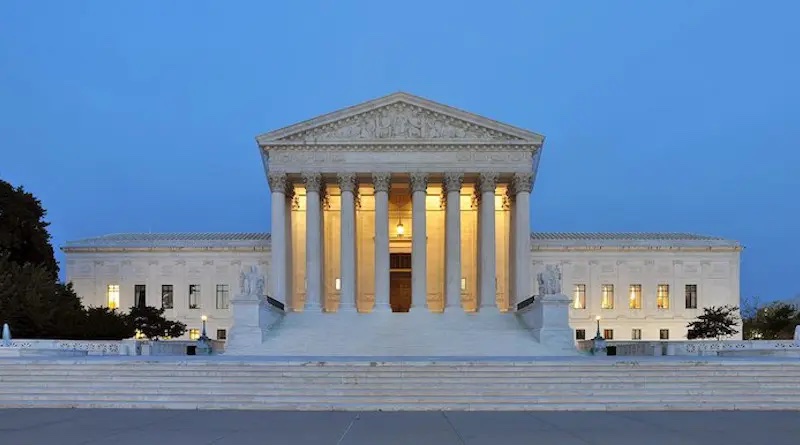Ambiguity With The Dobbs Supreme Court Abortion Case – OpEd
The well-publicized leaked draft of the Supreme Court’s majority opinion on Dobbs v. Jackson Women’s Health Organization, if it represents the Court’s final decision, would allow the State of Mississippi to retain the prohibition on abortion beyond 15 weeks into a pregnancy that was passed by the Mississippi legislature. That much is clear. But there is some ambiguity on the degree to which abortion would be permitted, more generally.
In several places in the draft ruling, the Court seems to say that this is an issue that should be left to the states. For example:
Our Nation’s historical understanding of ordered liberty does not prevent the people’s elected representatives from deciding how abortion should be regulated (p. 31).
Rather, wielding nothing but ‘raw judicial power,’ Roe 410 U.S., at 222 (White, J., dissenting), the Court usurped the power to address a question of profound moral and social importance that the Constitution unequivocally leaves for the people (p. 40).
Roe and Casey must be overruled, and the authority to regulate abortion must be returned to the people and their elected representatives (p. 65).
The Court’s draft decision seems to say that it is not up to the courts to decide how abortion should be regulated. Instead, it is an issue to be determined by state legislators and “the people.”
If this is the case, states like Mississippi can pass laws restricting the right to have an abortion, but apparently, other states could pass laws expanding the right to have an abortion. My state of Florida (and many others) have provisions for citizen initiative constitutional amendments. The draft ruling would seem to permit a constitutional amendment that would allow abortion without restriction.
The current wording of the ruling says “that the Constitution unequivocally leaves [this decision] for the people.” That appears to imply that should a state legalize abortion with no restrictions, such a move would be beyond the jurisdiction of the courts.
But the draft ruling also says, “We therefore hold that the Constitution does not confer a right to abortion (p. 65).” This seems to leave open the possibility that should a state broaden access to abortion, the Court could rule that women do not have that right. One thing to note is that the ruling is not about the right to life. It does not pass judgment on whether an unborn child has the right to live. It is a ruling about whether a pregnant woman has a right to have an abortion.
This ambiguity regarding a state’s power to regulate abortion is emphasized at the end of the draft ruling, which says:
The Constitution does not prohibit the citizens of each State from regulating or prohibiting abortion. Roe and Casey arrogated that authority. We now overrule those decisions and return that authority to the people and their elected representatives (p. 67).
On the one hand, this passage says that the issue is one that should be decided by “the people and their elected representatives” (which may also include the U.S. Congress). On the other hand, it seems to narrow that to “regulating or prohibiting abortion,” but not necessarily allow it.
The draft ruling clearly allows states to restrict a woman’s right to an abortion, but whether it also allows states to expand a woman’s right to an abortion is ambiguous.
The ambiguity may be deliberate. On the one hand, the Court’s narrow mission, in this case, is to rule on Dobbs v. Jackson. On the other hand, a conservative Court may want to leave the door open—to allow states to restrict access to abortion, but to enable the Court to, at a later date, strike down state-initiated expansions of the right to an abortion.
This is a contentious issue, so I will close by saying my analysis above does not take a side. I’m merely looking at the wording of the ruling to see its implications for abortion rights and regulation beyond the current case.
This article was published at The Beacon

